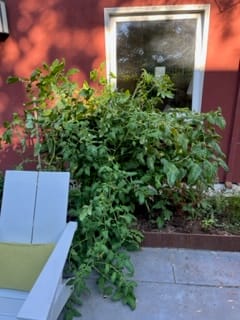The Tomato Plant That Ate Oakland
And My Disgust for Gardening Bans

For my entire life, I have lived with a garden. My parents had a farm when I was born, and one of my earliest memories of our house in Indiana was my father covering the backyard in black plastic sheeting to convert the lawn into a vegetable patch. When we moved, my mom always planted at least a few tomatoes in the yard. One neighbor, Angelo Pacifico, had a garden big enough to feed a family of 12, although he lived alone. It meant we were often accepting shopping bags and Mason jars of his yield. In high school, I worked at a community garden in Newark, and in college, I had a plot in a community garden in Chicago. I had one in Oakland when I moved here, and my only demands on our backyard remodel were fruit trees (we have lemon, plum, peach, and fig) and a kitchen garden area. My 3’ x 12’ patch is incredibly fertile; the single tomato I planted this year has grown over a trellis and two tomato cages.
I find it unimaginable, then, that some places forbid gardens, but this week, I learned that it’s common for towns and HOAs to forbid growing fruits and vegetables on a person’s own property. My mother and stepfather have moved somewhere that prohibits gardens, even in the backyard. My stepfather, being the handy contrarian that he is, built a large container on the patio, thwarting the HOA fascists and getting the garden he and Mom love, but the larger principle makes me angry. Only two states have explicit “right to garden” statutes, and in Virginia, where they live, only agricultural zones over five acres have certain rights to farm under state law.
Why do people ban gardens? I can’t find a full-voiced defense of these bans but I’ve gleaned from articles about people fighting the bans that there are a few stated and unstated reasons why communities ban growing fruits and vegetables.
- Gardens are “messy”: Messy means two different things. In one sense, messy means that they are unsightly because they are disorderly and don’t look aesthetically pleasing. In another sense, messy means that they attract pests and vermin. Given the subjective nature of beauty, it’s hard to imagine that a suburban HOA would get it right, but mainly the imposition of garden bans is about aesthetic and social control. As for pests, it’s true that no one wants rats in their yard. The problem is that rat appetites are even more subjective than beauty, and yard waste need not be edible to humans to be edible to rodents. In other words, you’re gonna have pests one way or the other unless you do basic pest control, so you might as well plant something tasty.
- “Food comes from the store”: This is a family joke whenever I offer my family something I’ve grown in the yard. It’s the equivalent of the veteran baseball players ignoring the rookie who hits his first home run. They usually eat it anyway. People do think, however, that food is only good if it’s been mass-produced and approved somewhere in the corporate food chain.When I lived in Alabama, the nosy neighbor across the street asked our babysitter why I was still breastfeeding. Liam was only five months old, by the way. The lady asked, “Don’t they have money for formula? How are they paying you if they can’t buy it?” When Tina told the woman that I believed it was healthier for the baby, the woman huffed, and said, “Formula is scientific!” Tina and I thought this was both hilarious and horrifying, and we agreed that it was good that the woman was long past her childbearing years. But her attitude reflected a larger belief about growing our own food: only poor people do it, and we’ve come far enough to put food outside of our social realm. HOAs and communities that ban gardens similarly believe that growing your own food is poor, tacky, and déclassé.
- Gardens are “wild”: some people like to make rules just so they can enforce them. HOAs are notorious for this, legislating house colors and fence shapes, and prohibiting art, food, and certain vehicles from being present on the property, never mind visible. There are people who thrive on conformity, crave it, and fear the chaos they believe would be unleashed without their nitpicky little rules. Remember the scene in A Wrinkle in Time when Meg and Cal see all the kids bouncing the ball simultaneously in front of identical houses? There are people who aspire to that, rather than seeing it as an illustration of evil.
I can’t think of any other serious reasons, good or bad, that people might oppose home gardens. Heavy pesticide use? Farm animals? Both of those problems are limited by the space available and can be regulated separately. The upsides of home gardens are unlimited. The availability of fresh seasonal produce is obvious, and the joys of getting one’s hands dirty cannot be overstated. The environmental benefits are legion. On top of all this, gardens aren’t just for their human producers; gardens are for “the pests,” i.e. the creatures we share the natural world with. If we are going to defeat climate change, we need to completely reconsider the physical land we occupy. We need to stop thinking of land as something we use and start thinking about it as something we care for. If we care for it by planting edibles and wildflowers and anything other than grass, the land will care for us by providing us with food and beauty. Today, your backyard; tomorrow, the National Mall.



